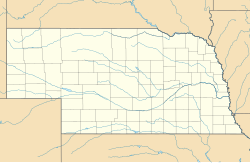| John P. Bay House | |
|---|---|
 John P. Bay House | |
| Location | Omaha, Nebraska |
| Coordinates | 41°17′11″N95°56′37″W / 41.28639°N 95.94361°W |
| Built | 1887 [1] |
| Designated | March 17, 1981 [1] |
The John P. Bay House is located at 2024 Binney Street in the Kountze Place neighborhood of North Omaha, Nebraska. Built in 1887 by George L. Fisher, the house was designed in the Queen Anne style. It was designated an Omaha Landmark by the City of Omaha in 1981.
